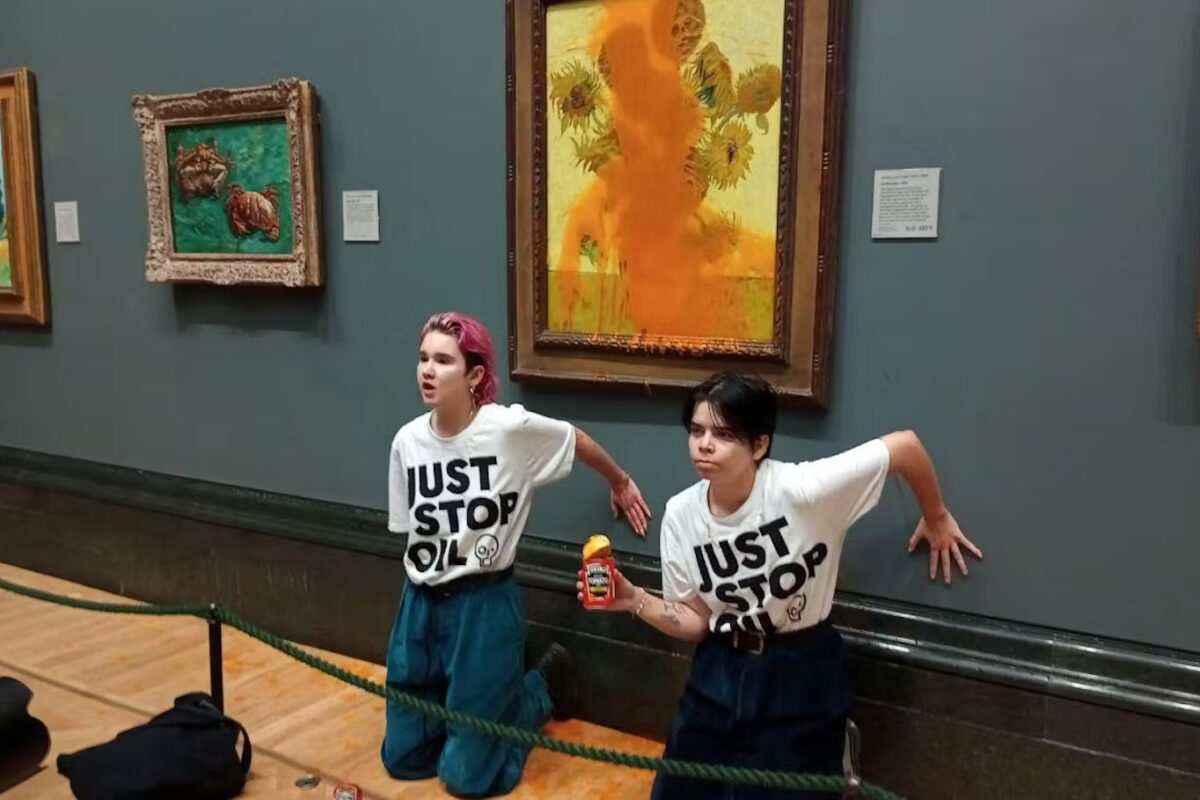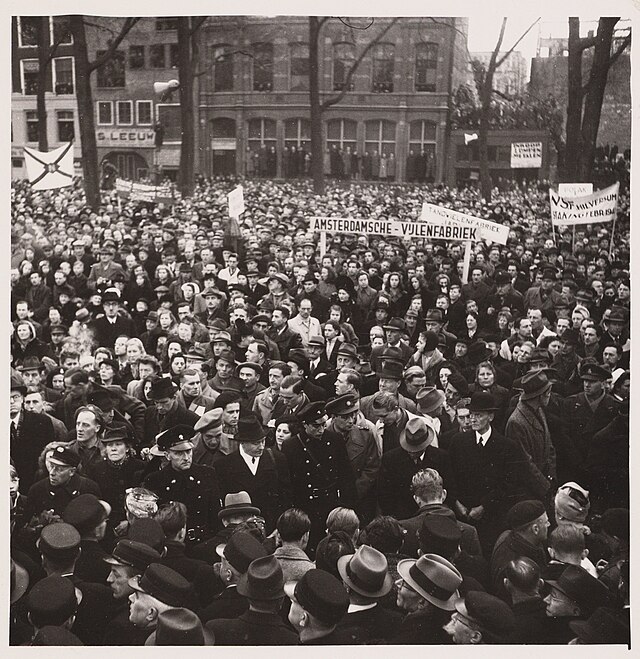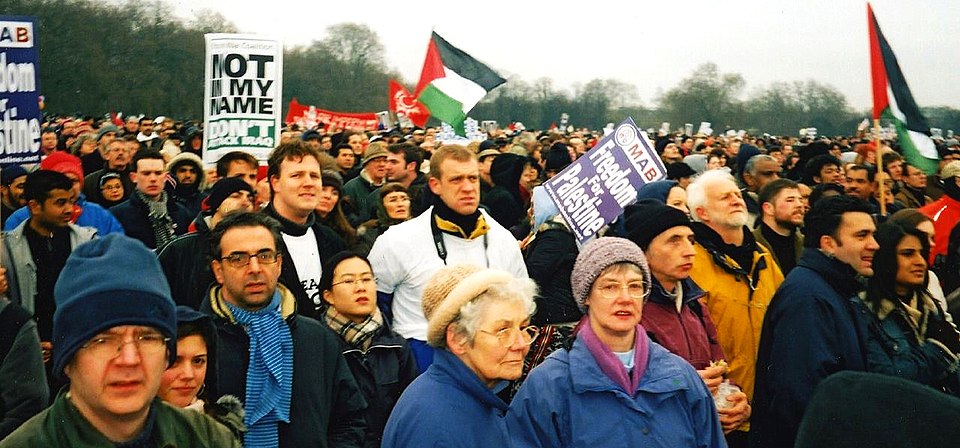Spattering tomato soup across Van Gogh’s Sunflowers, invading Rugby pitches in Twickenham, exploding confetti on an unsuspecting Sigourney Weaver mid-soliloquy: Just Stop Oil’s (JSO) infamy is impressive considering its mere three-year tenure. Branded petty, absurd, and obnoxious by a bevy of media outlets, and trolled relentlessly online, they shot into public consciousness with the subtlety of a flying brick and a burning planet as their backdrop. On April 26th, 2025, the group held its last demonstration in the centre of London––a peaceful and comparatively mundane march from parliament to the headquarters of Shell. Having ostensibly achieved its original aim––the United Kingdom’s government stopping the issue of new oil or gas exploration licences––their neon hi-vis jackets have been hung up. Direct action has officially been called to a heel. But the group is not surrendering in the fight for climate justice.
During JSO’s three years in action, its supporters were reported to have been arrested 3,300 times, imprisoned 180 times, and currently 11 of its members remain incarcerated. Sentences range from conspiring to create a public nuisance, to criminal damage, to disruption of traffic. Just this week, nine of its activists avoided jail, with the judge ruling that no harm was caused. Despite her ruling, she reprimanded the protestors––arrested at Heathrow Terminal 5––for treating the courtroom as an “extension of the protest.” Her reprimand was due to what she considered to be a lack of remorse and accountability. For JSO members, however, it seems that they differ from the judge as to where accountability ought to be taken.
They worked in extremes. But the crux of their argument was that the situation was extreme. Their high-profile tactics were disruptive, but nonviolent. The effects of climate change are more than a nuisance: they are fatal.
“In spite of the guilty verdict, of being held in prison and of my impending sentencing, I feel completely at peace. I acted in line with my conscience and moral convictions. I told the truth at trial, both about the climate crisis and about my actions and intentions. I know I acted nonviolently: without violence and actively against violence. I acted to prevent the real Public Nuisance that is climate breakdown,” wrote Ella, a 22-year-old member currently serving time in a women’s prison in Manchester after being found guilty of conspiring to create a public nuisance.
Protesting laws in the UK have become more stringent in the years since the conception of Just Stop Oil; the Public Order Act 2023 was specifically introduced to target climate activists, providing law enforcement agencies with greater powers to combat so-called “disruptive” protests. The new legislations countering such activity have not been met with universal acclaim. UN Special Rapporteur Michel Forst expressed his concerns to the BBC following the imprisonment of Dr Patrick Hart, who caused thousands of pounds of damage to fuel pumps during a JSO demonstration, saying, “In France you would receive a small fine, never prison. But in the UK peaceful protesters receive 12 months in prison.” The Joint Committee on Human Rights also called for the measures within the act to be watered down, citing the importance for residents of the UK to exercise their democratic rights.
The blockage of roads, interference of public events, damage to art and culture, and impact on emergency services spawned by JSO-led protests dampened its popularity somewhat in the public eye: inevitably, vandalism and inconvenience can lead to alienation. But their methods are the same that have been employed by activists throughout history: it could be argued that high-profile, disruptive, obnoxious tactics are those that have spurred the most change.
The Suffragettes engaged in relentless civil obedience under the motto “Deeds, not words.” Much like JSO, they were viewed as nuisances, the subjects of much mockery and accusations of overblown hysteria. Criticisms of JSO’s actions as ostentatious, unruly, or inconvenient prove that their formula worked as planned: isn’t every protest intended to be attention-grabbing, to disrupt, and dismantle? The response of the government to introduce stringent laws against such protestors seems to send a message that compliance and submission must be practiced, even when infringements on human rights occur around us. Peaceful marches may not immediately seem to challenge or disrupt, but they are still fundamentally radical, still conceived with the intent to draw eyes, change minds, and crucially, show solidarity.
“This is how civil resistance works: applying nonviolent pressure until we force change to happen,” the Just Stop Oil website reads. “It’s how the Freedom Riders forced an end to segregated buses in 1961. It’s how disabled people won accessible transport in the nineties and how Just Stop Oil won no new oil and gas licenses in 2024. We know how to win, but it’s going to take all of us.”
The fierce crackdown on activism was undoubtedly a factor in the group drawing to a close. The official line remains that the battle was won, their demand realized. But they’ve advised they will be taking a “different approach.” Coy as they have been about future plans, the message seems to be that outrageous antics will be dialled down. But while they may be retiring from civil disobedience, they are not retiring from their climate goals. The end of JSO is less of a shutdown and more of a reassembling. Like any good team preparing for battle, they are overhauling strategy based on the opposition. Public hostility and controversy were necessary tools for applying pressure to the government to stop oil. Now they need new devices.
In 2023, John Wight wrote a piece for Medium asserting that JSO was a failure. Echoing sentiments of many of the British public, he qualified their protests as devoid of self-awareness and empathy for the everyman. Theatregoers largely booed as Sigourney Weaver was wheeled offstage in the midst of The Tempest. Yet JSO protestors remained resolute, always remaining at the scene of the crime to take ownership of disturbances. “I can’t sleepwalk [my children] into a future of food shortages, life-threatening storms and wars for resources,” lecturer Hayley Walsh, one of the activists arrested at the West End said in a group statement. “Years of writing to MPs, going on marches and teaching my students to be more sustainable hasn’t seen the urgent change needed.”
A new podcast, Sabotage, launched with the goal of examining JSO’s tactics. Its hosts are nothing if not thorough: they worked to gain the trust of JSO and obtain interviews––no mean feat considering how tightly their ranks were closed. They approach the group with curiosity and openness, and what comes of that is a deeply human depiction of a coalition steeped in infamy. It’s a peek behind the curtain, but instead of revealing a man masquerading as a wizard, it’s a vibrant ecosystem stocked with plentiful courage, brains, and heart. The hosts noted that many of the activists were quiet, shy, self-possessed: not the dramatic, over-stimulated troublemakers painted by the media, but compassionate beings led by deep conviction.
The podcast also contradicts what naysayers have been alleging for years: it posits that their demonstrations were successes. Yes, they were lambasted by politicians and citizens alike, they were arrested and sometimes locked up, and they were widely mocked––but every stunt saw a sharp increase in donations. Even the ramping-up of police action against protestors has indicated success: a reaction wouldn’t be necessary if the action didn’t cause concern from above.
Their website now turns focus towards the necessity of a political and economic revolution, citing the role of corrupt politicians and self-serving billionaires in the climate calamity. “We’re just getting started,” they promise. They’ve already proven themselves as one of the world’s most effective climate campaigns: the lull is momentary, but the rebellion is still in motion.




